

Recovery Integrity
Recover Integrity Addiction Treatment. So when it comes to the notion of authenticity, RZA is like “He is my guy.”

RZA is a producer and also a hip-hop MC of a group called Wu-Tang from Long Island. I grew up listening to him. And I remember being 13 years old smoking weed in my cousin’s bedroom, listening to an album called Liquid Swords. And it was like an alien had landed and delivered an album from another planet. We were like, “Who are these guys?” And it is because their hip-hop lineage–like where they got their sound from–actually was not other hip-hop artists. Anyway, I heard this interview with Rick Rubin and RZA, and, basically, Rick was like, “Man…” (kind of like me) “Hey man, you are like an alien, but you are making–you started making this kind of music at like fifteen years old.
And RZA goes…He has his phrase. Being and Acting with Authenticity: What’s the Difference? There are two ways I look at authenticity.

I look at general authenticity as a state of being. I want to be an authentic person when I wake up every day in my life as a ground and as a foundation. The Role of People-Pleasing and Codependency in Addiction I talk a lot about the moral aspects of treatment and I am very resistant to removing morality from the conversation about addiction and recovery.
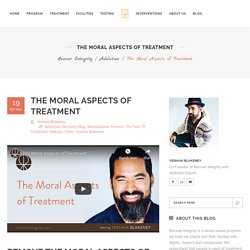
I understand why people want to do that. It’s to bring down the stigma to address the confusion around the free will issues, for it to be covered by insurance, I agree with all that. I agree with the reasons. Traditional 12-Step Treatment. What to expect in this episode: Understanding the evolution of addiction rehab & recovery is important to understand where we are headingThe 12-Step program is a spiritual program that evolved after psychotherapy failed to helpThis has become the foundation for most North American Treatment Programs, but the success rate could improve…
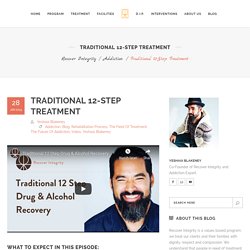
Why Choose Private Drug Rehab. The opioid epidemic and alcohol addiction have affected millions of Americans, in fact, most people can say they or someone very close to them, have been touched by the massive consequences of drug and alcohol addiction; with the likelihood of death by opioid overdose officially passing car accident deaths for the first time in 2018.
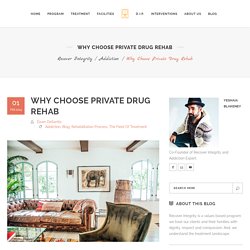
Drug rehab programs provide individualized, expert care for those struggling with drug and alcohol addictions, giving them the platform and foundation to maintain long-term sobriety. Smaller Sized Programs Private or luxury drug rehabs tend to have smaller, more individualized programs. Professional Meet & Greet at Recover Integrity. Hey Neighbors, We want to get to know you, build up our personal & professional relationship, and feed you snacks!
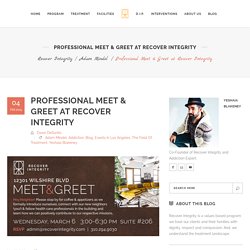
Please stop by for coffee & appetizers as we formally introduce ourselves, get to know you and fellow health care professionals in the building, Professional Meet & Greet at Recover Integrity. Medical Approach to Addiction. What to expect in this episode: The medical approach.
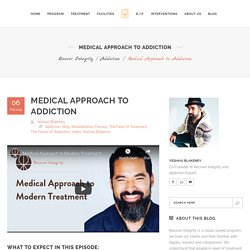
Treating addiction as a medical condition. The primary tool that we use for a medical condition is medicine.There are also non-harm-reduction, medical approaches to addiction.Predicting more and more complex pharmaceutical approaches to addiction in the future. Plant Medicine, Ayahuasca, & the Right Relationship Model. What to expect in this episode: Plant Medicine like psilocybin and ayahuasca are a burgeoning underground addiction solutionMuch like diet, there is a sliding scale of harm – in food and drug – but most fall into a fuzzy middleThe future will see movement away from the abstinence-based model toward more individual recovery care Plant Medicine, the spectrum of harm, and the Right Relationship Model.
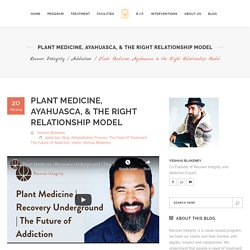
The Traditional Social Model of Recovery. What to expect in this episode: The form of recovery nearest and dearest to my heart is the traditional social model of recoveryIt’s profound, to watch a room full of people, who were previously in active addiction, coming together to talk and help each otherThe future will see a mix, of the new, exciting, plnt medicine and medical techniques, with this old, traditional, beautiful social model The Traditional Social Model of Recovery.
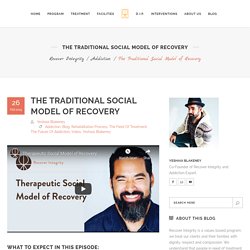
The Role of Psychology in Recovery. What to expect in this episode: Psychology has taken a central role lately, but traditionally, it is not ideal for treating addiction.
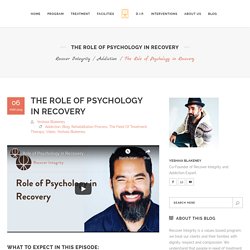
Commonly, after weeks, months, or years, therapists recommend AA or treatment because no progress can be made while in active addiction People have to immerse themselves in a culture of recovery and integrate recovery as part of their identity as the primary task of recovery Its a newer phenomenon that therapy has taken a central role in the world of recovery. Therapy and the Subconscious. Is Recovery Abstinence? What to expect in this episode: Is recovery (just) abstinence? You won’t be protected from relapse unless you learn to change and grow through the underlying issuesThe fastest way to learn, grow, and change is to be in an immersive environment. That’s why the recovery community is so important. People don’t ask it because they think they know the answer, but answering that question wrong leads to heartache and tragedy for millions of families. The Controversial Nature of Alcoholics Anonymous. What to expect in this episode: Where, specifically, is your resistance coming from?
CBT & DBT are nice , but they are cost prohibitiveThe most radical thing about AA is that it’s FREE The resistance that people have to the 12 steps can be overcome. The Rebel Side of Alcoholics Anonymous. What to expect in this episode: People suffering from addiction often feel very rebellious insideAlcoholics Anonymous is rebellious, it rejects traditional hierarchy & is freeThe most radical thing about AA is that it’s completely detached from the market The other thing about Alcoholics Anonymous; addicts and alcoholics often feel rebellious inside. There’s a rebel piece that grows inside of us during the teenage years and sometimes we have a hard time growing out of. (…Maybe we shouldn’t grow out of it.) Dual Diagnosis vs Multidimensionality. Some time ago, I had the opportunity to work in the Skid Row area of downtown Los Angeles. In those days (the early ’90s) the residents of the area were divided between need “mental health services” or those needing “addiction services.”
This distinction was usually the result of some odd government funding rules or just the general ignorance of the time. It must have been extremely frustrating for clients to walk back and forth between programs as both programs had strict entrance criteria. Invariably, the client would give up and end up using and just sleeping on the streets. The Dual Diagnosis revolution came about as both traditional mental health, and substance abuse programs began to realize that clients didn’t fit into these neat boxes.
Mental health disorders and substance abuse issues are only a small part of the recovery plan Click To Tweet Services such as financial and legal planning, helping the family, and assisting clients in finding good-paying jobs and housing. The Reality of Treatment Success Rates. Coming to treatment has always been a hard threshold to cross – but more so now… Working in treatment for a long time, I’ve experienced greater consumer wariness. Are We Defining Treatment Success the Wrong Way? Let’s face it, the media has an impact on our opinions and how we view the world.
Unfortunately, seeing the world through the eyes of the media isn’t always…well, reality. Take substance abuse treatment. Popular culture believes a person successfully completing treatment will stay away from drugs or alcohol for the rest of his or her life. As a result, life gets better. Interventions and Recovery: a Process. How Long Do I Need Addiction Treatment? The Desire to Move Forward.